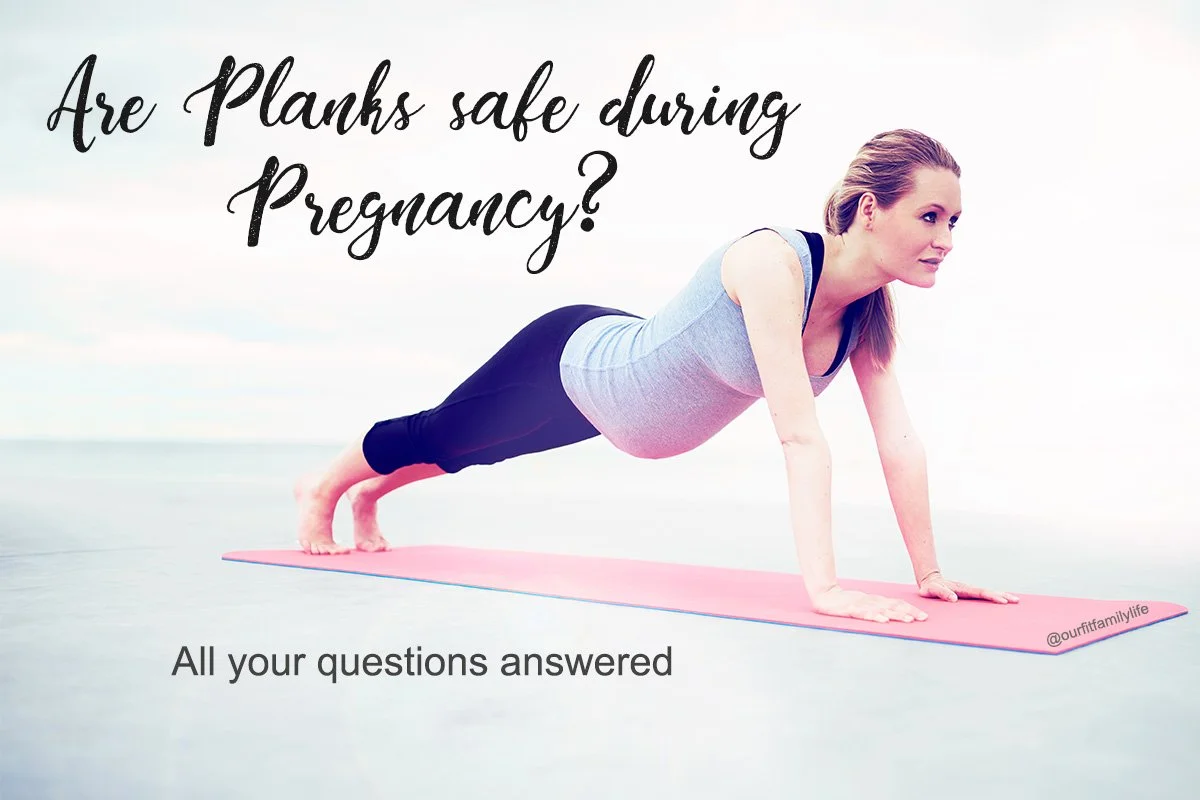You may have been told that “During pregnancy, you can keep doing whatever you were doing before. It’s just not the time to introduce something new”. Well, let me disagree with that.
It’s not big news that everything shifts within your body during pregnancy, and as your baby grows, massive changes happen. Among those:
your rectus abdominis (6-pack muscle) stretches around 15 cm (6 inches) by the end of the pregnancy.
the connective tissue of the abdominal midline (linea alba) thins and stretches.
your pelvic floor muscles are loaded with extra weight and pressure.
the ligaments and joints in the pelvis relax and become unstable.
To make the most of your workouts, serve your pregnancy, and prep your recovery, you need to change how you exercise and work on your core – which may mean skipping planks, and introducing some new kinds of core exercises!
Can you work on your abs during pregnancy?
You can (and should!) work on your core during pregnancy, BUT you may need to change your mindset and exercise repertoire.
Most traditional ab exercises such as crunches or front planks are designed to tighten the abs. However, as I wrote above, our abs will stretch 15cm by the end of the pregnancy. So working on tightening your abs is counter-productive and fighting against the natural and necessary stretch that needs to occur during pregnancy.
Suppose your “6-pack” muscles (rectus abdominis = superficial ab muscles) are toned, tight, and shortened. In this situation, they can’t stretch enough lengthwise to accommodate your growing uterus, and they are forced to separate more from side to side than they would have normally. In this case, you’ll have a greater chance of developing a diastasis recti (learn more about the difference between a healthy naturally occurring abdominal separation and a Diastasis Recti during pregnancy)
On the other hand, focusing on intentionally connecting your deep core is very beneficial during these 9 special months.
The goal of core exercises during pregnancy is to maintain core connection, support your spine, pelvis, growing baby, and prevent pelvic floor issues or diastasis recti from happening.
The pelvic floor, transverse abdominis (the deeper layer of your abs), spinal stabilizers, and diaphragm form the inner core muscles and work together to maintain a functional core.
The key to maintaining core connection and limiting the gap to a healthy ab separation is learning how to move and breathe properly with your growing belly, while strengthening your core safely, and limiting stress and strain on weakened areas.
The problems with front planks during pregnancy
Front planks are load-bearing isometric exercises, so when performed with a weakened core system:
They may strain the thinned and stretched abdominal wall.
The problem with front planks and pregnancy #1
In a front plank position, the weight of the baby, extra fluid, and your internal organs can create a lot of extra stress on your abdominal wall, which put strain directly onto the thinned and stretched ab muscles and ab midline.
Your abs are stretched and can’t operate at full strength during pregnancy, and that’s totally normal! Your ab muscles will get progressively weaker, and front planks or traditional ab exercises can not strengthen a compromised muscle group.
You may even start to feel like your belly is unsupported, and “hanging”.
In short, front planks may not be effective or beneficial in a compromised core system – they may even be harmful and exacerbate the natural abdominal separation.
They may hurt your lower back.
The problem with front planks and pregnancy #2
Because of the nature of pregnancy, expecting women are at higher risk for lower back pain. As your belly expands, your center of gravity shifts, altering your posture and putting more strain on your lower back. When lacking core strength, your back takes the burden of this pregnancy weight.
So, if you perform front planks during the 2nd or 3rd trimester, there’s a good chance that your back muscles will take over and try to compensate for your weakened ab wall, but the downward pull of gravity and growing baby can pull at the lower back muscles and lead to injury.
So, when should you stop doing front planks during pregnancy?
It's probably OK to hold front planks if:
You're in your first trimester.
You have learned proper form and breathing while doing front planks pre-pregnancy.
However, I recommend avoiding front planks if:
You're in your second or third trimester.
Your abdomen domes or bulges while holding the plank position (a mirror placed under you on the mat can help make sure there is no triangular / point shape on your ab midline). Coning or doming is a red flag that your ab midline can’t handle the intra-abdominal pressure.
You aren’t sure about the proper form or breathing to use while holding a front plank.
You're at risk for diastasis recti or have been diagnosed with it (women who are older when they get pregnant, have a higher BMI, have had multiple pregnancies or are carrying multiples, are at a higher risk of developing diastasis recti during or after pregnancy)
And, of course, if you're not cleared for exercise by your Doctor.
In short:
Exercising during pregnancy should:
help you prep your body for birth.
honor your transformation.
help you go through all the changes while limiting common aches and pains.
and begin prepping your recovery.
Our breath is what connects our inner core system: pelvic floor, diaphragm, deep abs, and back muscles.
Performing core exercises based on core breathing is the best thing you can do to help your body adjust during pregnancy.
Note that every woman will experience some degree of pelvic floor weakening and abdominal separation during pregnancy. However, including abdominal breathing exercises in your daily life can:
help decrease the severity of the separation
maintain continence and proper core function
and begin the preparation for your recovery
Since most of us aren’t connected to (or even aware of) our deep core in everyday life, reconnecting with yours can take some time and practice, but it will be so beneficial for your pregnancy, postpartum recovery and beyond.
Connecting to your inner core, and learning how to move and breathe with your growing belly is key to feeling your best, preventing injuries, and fully enjoying this unique time.
This is the perfect time to be pro-active and re-connect with your core in every sense!
Start your Pregnancy Workout Routine & Wellness Plan today! ✨
To make the best of these 9 months, be sure to read :
First Trimester Exercises - Do’s and Don’ts
12 Pregnancy Tips to learn how to have a healthy baby and experience
Diastasis Recti vs abdominal separation during pregnancy




